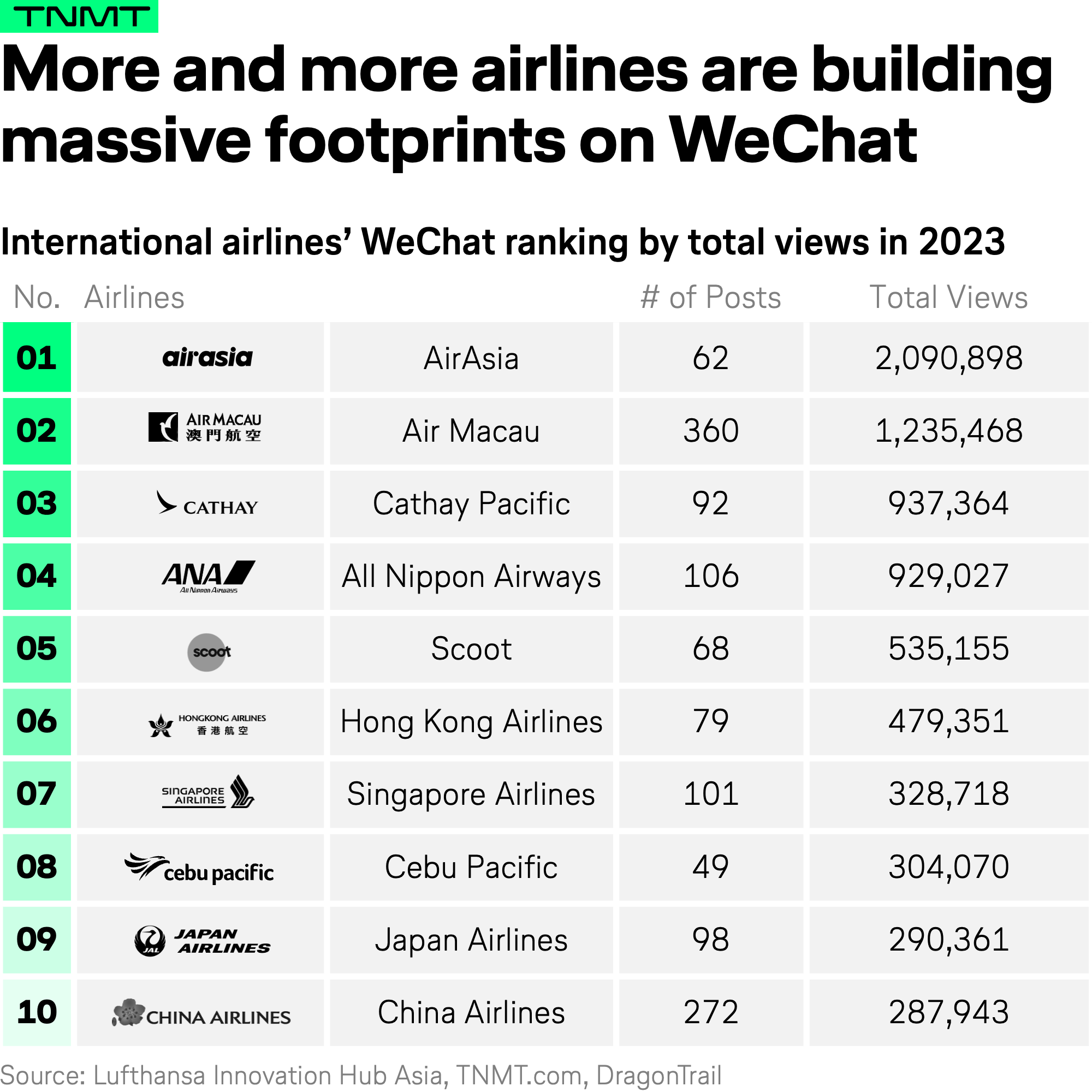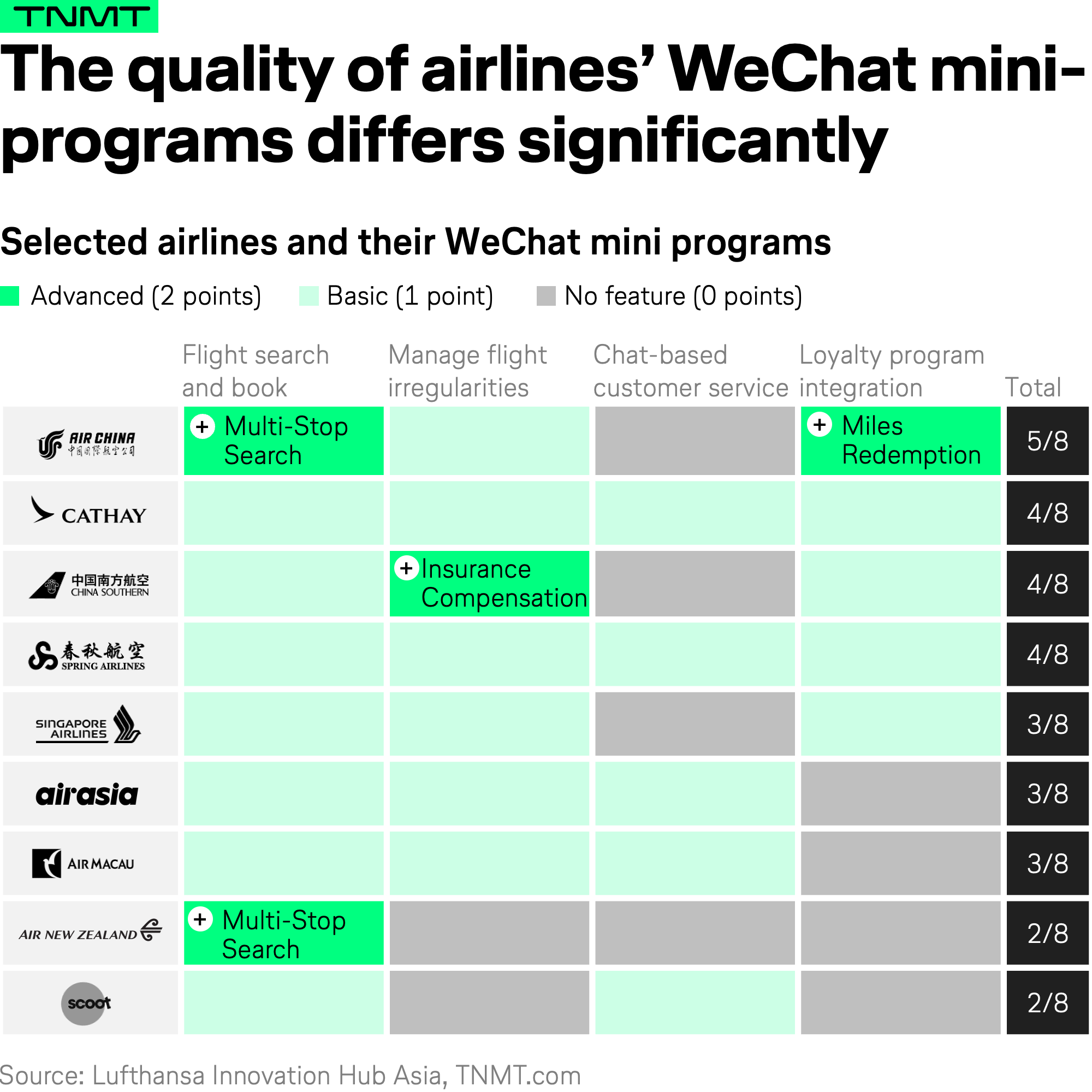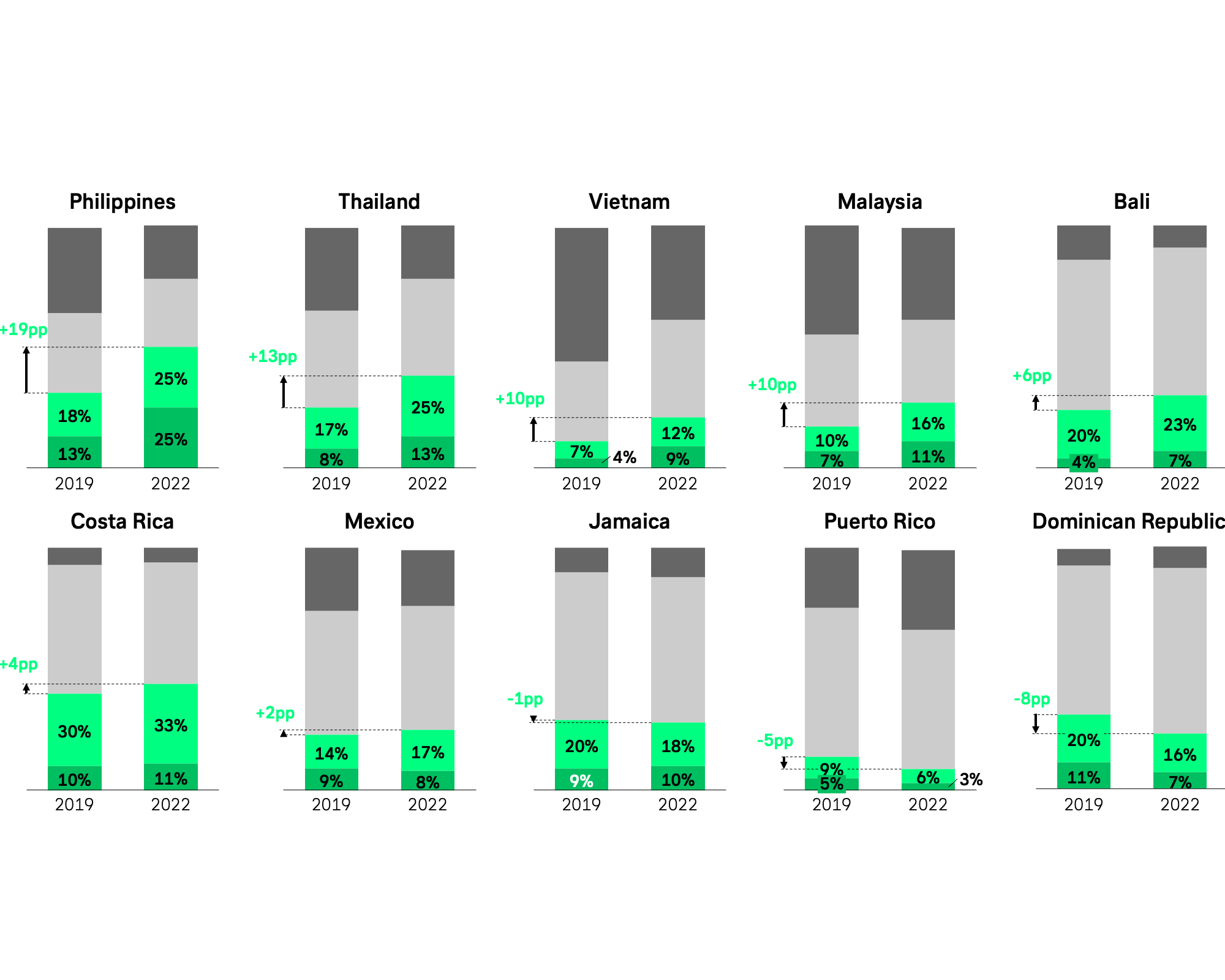WeChat stands as one of the most remarkable mobile app success stories the world has ever witnessed.
Owned by Chinese tech giant Tencent, the app has evolved from a simple messaging service, similar to WhatsApp, into a genuine superapp with more than 1.3 billion users. Predominantly popular in Asia, especially China, WeChat’s functionalities now span a wide spectrum—from messaging and social media to real-time location sharing, as well as extensive services like streaming, gaming, and, critically, payments.
This transformation was largely fueled by the introduction of “mini programs” back in 2017. These allowed third parties to develop a range of in-app services, including transactional capabilities essential for retail sectors.
Consequently, numerous retail verticals, including the travel industry, have integrated into the WeChat ecosystem. Particularly within the travel sector, Asian airlines have capitalized on WeChat’s extensive reach and versatility. Both domestic and international carriers are now leveraging WeChat not just for brand marketing and PR but also for embedding more complex service functionalities such as customer support and flight bookings through tailor-made mini programs. This integration has paved new avenues for enhancing customer interaction and improving the travel experience.
This analysis delves into how airlines are utilizing WeChat’s mini programs to revolutionize the traveler experience.
We also aim to evaluate and rank their effectiveness and explore how these innovations could potentially inspire similar transformations in the digital travel landscape of the Western world.
Airlines’ Strategic Engagement with WeChat
To get started, let’s delve into the airlines that have most effectively mastered WeChat thus far.
The chart below ranks the top ten airlines based on their WeChat presence throughout 2023, measured by the total views on their content.

As expected, Asian carriers dominate this list, reflecting their strategic imperative to engage with their primary customer base directly.
However, what unifies these diverse airlines when it comes to their use of WeChat mini programs?
The key lies in accessibility and utility. WeChat mini programs offer users effortless access with just a simple tap within the app, equipped with features specifically tailored for in-trip assistance. While these mini programs often mirror the functionality of airlines’ native apps, they uniquely cater to users who may not have these apps installed—serving as a vital tool for travelers who typically refrain from downloading multiple airline apps.

This approach not only simplifies the user experience but also ensures that travelers have immediate access to essential services without the burden of additional downloads. As discussed in our previous analysis, this convenience is a significant advantage, especially for travelers reluctant to clutter their devices with numerous travel apps.
Assessing the Pioneers: Advanced WeChat Mini Programs by Airlines
While establishing a WeChat mini program is a step forward, its true success lies in delivering tangible benefits that cater to travelers’ needs—such as efficient flight booking or adept handling of flight disruptions. To evaluate the effectiveness of these programs, we analyzed several top airlines noted in the previous ranking, complemented by a few smaller Chinese airlines recognized for their innovative mini programs.
Our evaluation criteria were based on the diversity and sophistication of the services offered through these mini programs.
The chart below presents our findings:

Air China leads with the most comprehensive WeChat mini program, closely followed by other major airlines. Here’s what sets their programs apart:
1. Flight Booking
Nearly all airlines in our study allow travelers to book flights directly via WeChat. Air China and Air New Zealand are particularly noteworthy, supporting complex multi-stop itineraries directly through the app, thus obviating the need to visit external airline websites or online travel agencies.
2. Management of Flight Disruptions
Apart from Air New Zealand and Scoot, all featured airlines have incorporated basic tools to manage flight disruptions within their mini programs. For instance, they enable passengers to obtain the necessary documentation for compensation claims in the event of cancellations. One airline, China Southern Airlines, offers enhanced functionality by allowing passengers to rebook their tickets directly through the mini program.
3. Customer Service
Five of the nine airlines provide direct customer service options within their mini programs. A common approach involves incorporating chat-based customer support, which utilizes WeChat’s native messaging features to facilitate smooth and familiar interactions. This integration allows airlines to offer support in a context that users are already comfortable with, mirroring the ease of private conversations found elsewhere on the platform. These chat functions are designed to address more complex inquiries that go beyond the app’s self-service capabilities, ensuring comprehensive support is just a few taps away.
4. Loyalty Program Integration
Several full-service carriers have integrated their loyalty programs into their WeChat mini programs, significantly enriching the user experience. For example, China Southern Airlines allows passengers to use their accumulated miles for a broader range of services beyond mere travel needs. Moreover, loyalty program details like check-in privileges and lounge access are seamlessly integrated, simplifying processes and enhancing the overall travel experience.
In summary, these functionalities not only streamline travel but also enrich the customer journey, demonstrating the potential of WeChat mini programs to significantly transform airline customer interactions.
Exploring the Success Factors of WeChat Mini Programs in Aviation
WeChat mini programs have transformed how airlines interact with their customers in China. These programs successfully address several critical aspects of digital consumer behavior and technological integration, making them particularly effective for the aviation sector.
Below, we delve into the key reasons behind their success:
Mobile-First Adaptation
A significant strength of WeChat mini programs is their alignment with China’s mobile-first user base. Nearly all internet users in China access the internet via mobile devices. By transitioning from traditional web-based services to mobile-centric experiences within WeChat, airlines can engage a broader audience and enhance service accessibility. This is particularly beneficial in China, where reliance on foreign servers can slow down web-based services significantly.
Rapid Development and Deployment
The development framework for WeChat mini programs offers a streamlined alternative to traditional app development, which often requires building and maintaining separate versions for iOS and Android. Mini programs, however, are developed just once and housed within the WeChat ecosystem, significantly reducing development and maintenance time.
This efficiency allows airlines to quickly roll out and iterate on services tailored to specific traveler needs. For example, China Southern Airlines has utilized mini programs to simplify complex processes like pet travel reservations, making it as straightforward as booking a passenger flight and providing clear, accessible information right within the program.
Importantly, by addressing such niche traveler needs through mini programs, airlines can efficiently cater to specific customer segments without the extensive time and expense required to update full-fledged airline apps.

Enabling Direct Bookable Content
Mini programs excel at offering direct bookable content, significantly enhancing user engagement and convenience. Airlines can integrate streamlined booking systems within their mini programs, enabling users to find travel inspiration—such as through video content—and then directly book from the same platform. This integration is especially crucial in a market like China, where users expect a seamless and interconnected digital experience.
Additionally, airlines can include other travel-related services, such as hotel bookings, car rentals, and customized travel experiences, transforming their mini programs into comprehensive one-stop travel shops that cater to all aspects of a traveler’s journey.
A Call to Action for Western Airlines
As we have shown, WeChat mini programs have demonstrated their value as effective customer engagement tools. While WeChat’s dominance is unique to China and Asia, there are compelling reasons for Western airlines and travel brands to explore this mini-app landscape:
1. Local Consumer Connection
Adapting to the native ecosystem of messaging super-apps like WeChat is crucial for engaging Chinese outbound travelers. These travelers show strong loyalty to their preferred platforms even when abroad, and with Chinese tourists known for their high spending on accommodation, food, and experiences, connecting through a familiar platform like WeChat can enhance customer satisfaction and loyalty.
2. Learning from Mini Program Successes
Western airlines should note the efficiencies and customer satisfaction improvements seen with WeChat mini programs. Many Western airlines have been enhancing their native mobile apps, but the key takeaway from WeChat’s success is to meet customers where they are most active digitally. Exploring integrations within popular Western platforms could be similarly advantageous, which brings us to recommendation number three.
3. Looking to the West’s Own Mini Program Solutions
Though WeChat’s level of influence may not be replicated in the West, there are comparable platforms that are mostly flying under the public radar so far. Apple’s App Clips, for example, offers functionality similar to WeChat’s mini programs. These lightweight applications can be used for specific tasks and offer a practical alternative to downloading full mobile applications. American Airlines, for example, has successfully utilized App Clips, allowing passengers to check in using their mobile devices without needing to interact with kiosks or download the full app.
By learning from Asia’s advancements and integrating similar technologies, Western airlines can potentially transform their customer engagement strategies, enhancing the overall travel experience and operational efficiency.













